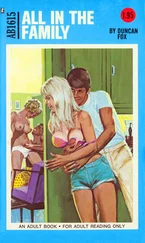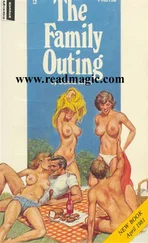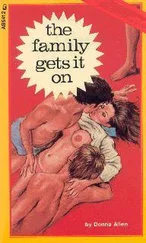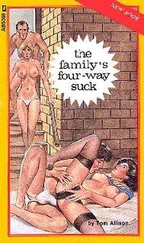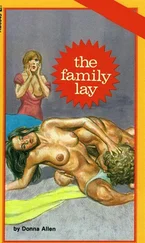Ellen’s eyes are all over the place as she struggles to take it in. “George said . . . he’s got grandparents called Offord, but he says they’re not blood relations. His mum told him they were her godparents, and took over as parent figures once she was estranged from her biological family.”
“I’ve seen Anne’s birth certificate, thanks to this detective,” I say. “Martin and Denise Offord are her biological parents.”
“So . . . so . . .” Ellen is starting to look angry. “She just . . . I mean, she just lied about that whole story, all the . . . ins and outs of it? She created a whole other life and tragic past for herself and she made her kids believe it ?”
“Yes. And let them think that they were under threat from someone who doesn’t exist: Allisande Ingrey. When the only real threat to their well-being is Anne herself.”
“But . . . but George believes it. Oh my God,” Ellen whispers. “Why would anyone do that? Why?”
“I don’t know,” I tell her. Mad, crazy, loopy, insane . . . none of these words does justice to the enormity of what Anne has done.
“It has to be true,” Ellen insists.
“No, El. It doesn’t and it isn’t. Why were George and Fleur called Urban and Garnet Ingrey when Ingrey was supposed to be their mother’s maiden name? What about their father’s surname? What happened to that?”
“Anne might be a feminist,” says Olwen.
“More like a rampant narcissist,” I say. “Her children—whom she regards as her property—had to have the same name as her in her fabrication. I think she views Stephen Donbavand as irrelevant—just a lackey.”
“But all the details . . .” Ellen is still shaking her head. “I mean, is any of it true? I can’t believe anyone would come up with all that, based on nothing.”
“Anne’s lies are based on at least one piece of very real pain,” I say. “I had my suspicions when I was in her house—something occurred to me, but I needed to check with her sister Sarah to be sure. So I did. I also needed to read your story, El, and now I have. Now I’m sure.”
“What?” asks Ellen. “Tell me.”
“I will. First, though, I need to write Anne a letter.”
“Why? If you’re right and she’s that big a liar, you should have nothing to do with her. What are you going to say?”
“I’m going to give her the chance to see sense and change her behavior. Don’t tell me it won’t work—I know that.”
Do you? Or are you secretly hoping that you—the voice of pure, unbiased reason—will be able to get through to her and save the day?
“I’m doing it for my own sake as much as Anne’s or anyone else’s,” I tell Ellen and Olwen. “Having heard and read so many lies, I’d like to see it written down: the truth. What I know. I need to know Anne’s seen it—that she’s read every word. After that, if she turns away from the chance of sanity for her family, that’s up to her.”
“And that’s when you call Social Services and tell them she’s keeping her son locked up on his own in the house day after day,” says Olwen. “Though, as I’ve said, I’d do that right now.”
“No,” Ellen says flatly. “George would end up in care. That can’t happen.” She looks at me. “He wouldn’t last five minutes, Mum. You know what people are like. Not all people, but lots,” she qualifies.
I nod. It’s as if we’re two adults discussing a vulnerable child.
“If we’re going to talk about knowing what people are like . . .” says Olwen. “Confronting a pathological liar doesn’t work. Ever. Trust me, I’ve tried it.” She sighs. “One day, if you’re unlucky, I’ll tell you my life story.”
Pas devant les enfants.
“When challenged, all they do is make up more lies. ‘Oh, you hired a detective?’ Anne will say. ‘Well, guess what? I hired him first and paid him to tell you the wrong thing and hide his true findings.’ She’ll lie and lie and lie—because you’re not real to her, Justine. You’re a pawn in her game. Everyone is. She isn’t real in her own mind. That’s how she can believe in a false identity for herself so easily. She has a tenuous, shaky, unsatisfying sense of self—all compulsive liars do. Generally, they’ve grown up in family structures that reward dishonesty and punish honesty: ‘Yes, Dad, of course you’re right about everything. You’re a loving, caring family man, and not a violent alcoholic narcissist—of course.’ ” Olwen shakes her head. “That kind of family brainwashing’s almost impossible to undo. I’d say your chance of persuading Anne Donbavand to pursue a more truthful path through life is almost nil.”
“How do you know all this?” Ellen asks her. “About liars?”
“Apart from the aforementioned life story, you mean? I’ve trained myself: observation and analysis.” Olwen manages to look humble as she says this. “People walk through my door, interested in a puppy from one of my litters? I’ve got roughly thirty seconds to size them up, decide if they’re likely to be able to provide a good home. In those thirty seconds, I have to notice everything: Do they look at me or do they look past me? Do they speak to connect or to impress?”
“All right, so what do you suggest I do?” I ask her.
“About Anne?” Olwen shrugs. “Depends what you want to achieve.”
“Apart from keeping my family safe, I want to help George and Fleur.”
“Well, if I were you, I might try and call Anne’s bluff. I might . . . I mean, obviously I haven’t thought this through, but I might pretend to be Allisande Ingrey, as per Anne’s fantasy, and see if that has any effect. How does a liar who’s also a control freak react when someone else, a stranger, opens up her lie and climbs right in to pretend it’s the truth? Suddenly she’s got an uninvited coconspirator—what would she do then?”
My breath catches high in my throat. “Oh my God. Olwen, you’re a genius.”
“Mum, what?” Ellen sounds anxious. “I don’t trust you when you get carried away.”
“I’ve had a brilliant idea.”
“But it was Olwen’s idea.”
“Part of it was and part of it wasn’t,” I mutter. “I’ll do both: my plan and Olwen’s.”
“I don’t have anything as solid as a plan,” says Olwen. “Only a vague leaning in a particular direction. I’m probably wrong.” She smiles. “Often wrong, but never in doubt—that’s me!”
“I have a solid plan, thanks to you,” I tell her. “It starts with me writing Anne a long letter. And then . . .” I run out of words. Too busy thinking. If I could work it out . . .
You never will. Neither will Ellen, neither will Alex. We are not magic.
“Ellen, would you mind if Olwen read your story?”
Ellen shrugs. “As long as I don’t have to read it, ever again. It’d only make me feel stupid for believing it. There were things in it I thought were beyond weird when George told me. I thought, ‘No way,’ but they were just too strange to be made up. Knowing he was telling the truth—knowing he believed he was—made me believe it. Even the parts that I can totally see now are too insane to be real. George kept saying the Ben Lourenco story was unbelievable—and he’s right, it is, it’s insane —and I just thought . . . impossible things that shouldn’t happen do happen. ”
“It’s not your fault that you believed the story, El. Or George’s. However hard it was and is to believe, it’s close to impossible to believe any mother would lie to her son the way Anne has to George. You’ll probably spend several months reflex-thinking, ‘Surely it can’t be a lie.’ It still happens to me at least once a day.”
Читать дальше


